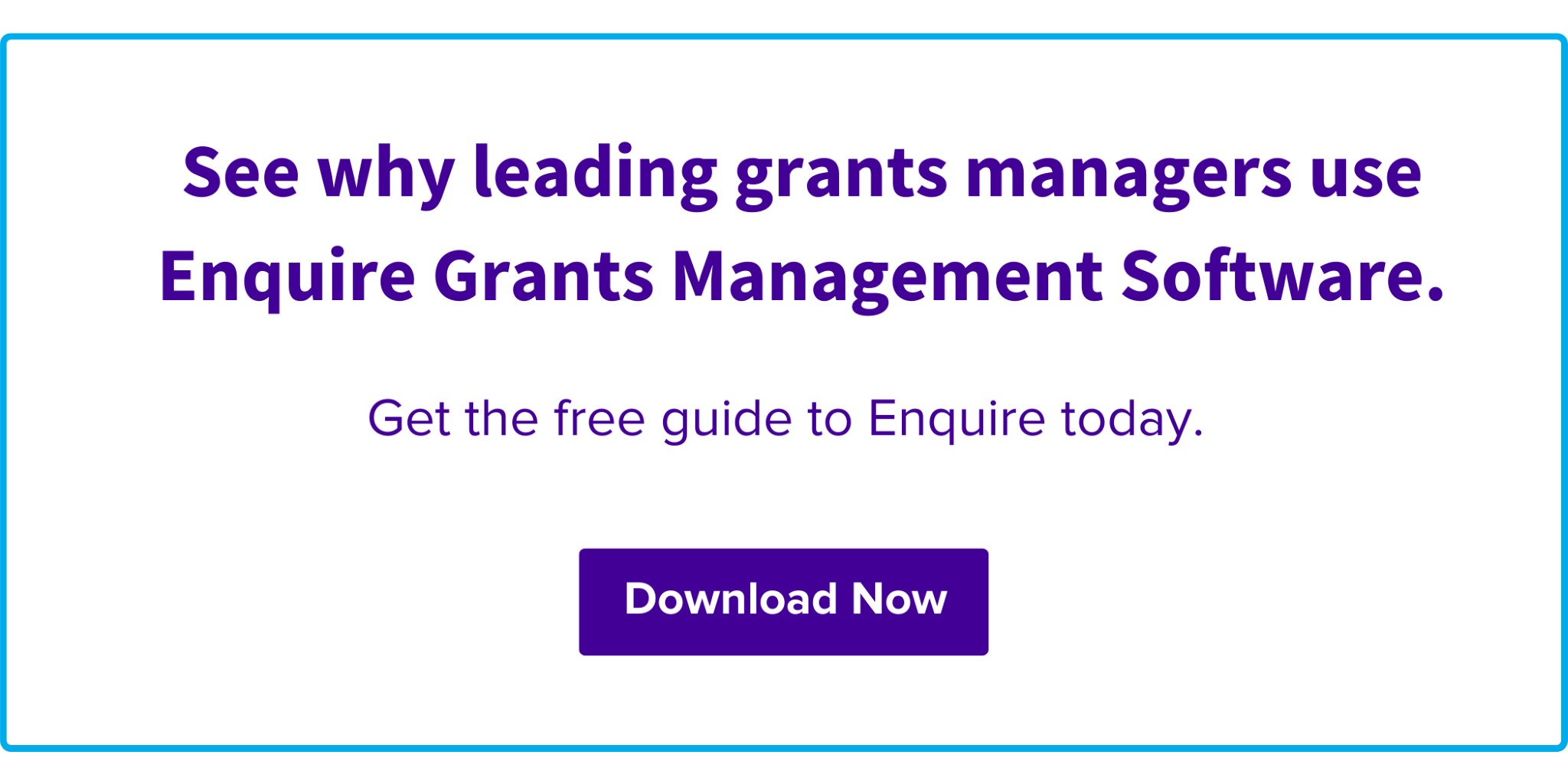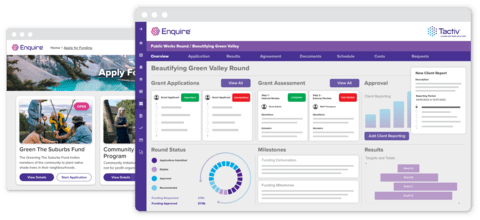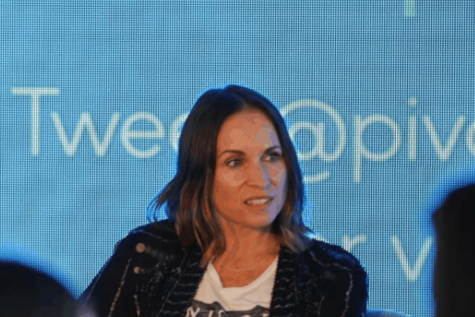Why is Grants Management Important?
Grants management processes are critical to a range of sectors including the government, not-for-profit, corporate, and higher education sectors. By enhancing their grants management, organisations in these sectors increase the likelihood of successful grant project delivery. Effective grant management protocols are also essential to avoid negative outcomes which can have serious repercussions on an organisation’s reputation.
These grants management practices are also important due to the financial value of grant spending, and the complexity of achieving the outcomes proposed in grant projects. Take for example, a federal government department. Governments provide billions of dollars in the form of grants every single year. This money is paid out with the intention of achieving a wide range of important social, environmental, and economic outcomes. But how do governments, or other grantmaking organisations, know that this money is being well spent?
In this article we’ll explore who is involved in the grants management process, the essential elements of grants administration and the key phases of the grant lifecycle. We’ll also cover tips for managing grants transparently and showcase real examples of organisations who have implemented reliable systems for successful grants management.
Who Is Involved in Grants Management
Before we explore what grants management entails, it is important to understand who is involved in the grants management process, and what they are responsible for.
Grantmakers and Grantseekers
The parties involved in grants management have traditionally been divided into two groups, grantmakers and grantseekers.
- Grantmaking organisations, also referred to as grantors or funders, create grant opportunities and are responsible for ensuring grants align strategically with organisational goals. Grantmakers are also responsible for allocating and awarding funding to grantseekers, and ensuring they deliver on their proposed grant projects.
- Grantseekers, also referred to as grantees or applicants, are individuals or organisations who apply for grant funding, often with the intention of delivering a social outcome.
While this framing is useful to understand the basics of grants management, it also creates an artificial divide, given a growing array of organisations do not fit neatly into one category or the other. Social enterprises, community foundations and not-for-profits, for instance, rely on funding from the public or private sector that is then redistributed in the form of grants.
Grants management is a collaborative and multifaceted process, and this is especially true when accounting for the various structures applied to funding in-flows and out-flows. For this reason, it is worthwhile to consider a grants management perspective, and implement grants management systems that account for every situation.
For those organisations who are seeking to allocate funding to environmental, social, or economic projects, it is essential that they have a manager in place to coordinate their delivery. In most organisations, these team members are referred to as grant managers.
The Role of the Grant Manager
Grant managers are a type of project manager, responsible for overseeing the entire grant lifecycle, including the planning and creation of a grant fund, the assessment of grant applications, the awarding of grant funds, and reporting on grant outcomes. In some organisations they may also be called fund managers, or in some instances, simply project managers.
The grant manager’s role also involves managing documentation, maintaining compliance with relevant regulations and organisational standards, as well as managing the wider grants management team. As such, grant managers are often skilled in relationship and stakeholder management, communication, and planning.
With deadlines and deliverables plotted across multiple grant projects, often simultaneously, time management is another essential skill. The diversity and complexity of the grant manager’s role necessitates frameworks and a range of best practices to ensure that grants meet their delivery requirements. To overcome this complexity, and systematically implement best practices, most grant managers are using time saving purpose-built grants management systems.
The Grants Management Process
Grants management is a complex process with a diverse array of stakeholders, business processes, and goals. For grant managers to do their jobs effectively, and deliver effective grant outcomes, it is essential that they have a clear structure and set of guiding principles to minimise risks and errors.
By adopting a lifecycle-based approach to project delivery and applying these grants administration principles and best practices, grant managers and their beneficiaries are more likely to ensure a successful grant rollout.
The Phases of the Grants Lifecycle
The grant lifecycle is the most fundamental framework required to effectively manage a grant project. While there are a variety of steps necessary to manage a grant that could be specific to an organisation, or funded program, the three core phases of the grant lifecycle remain the same.
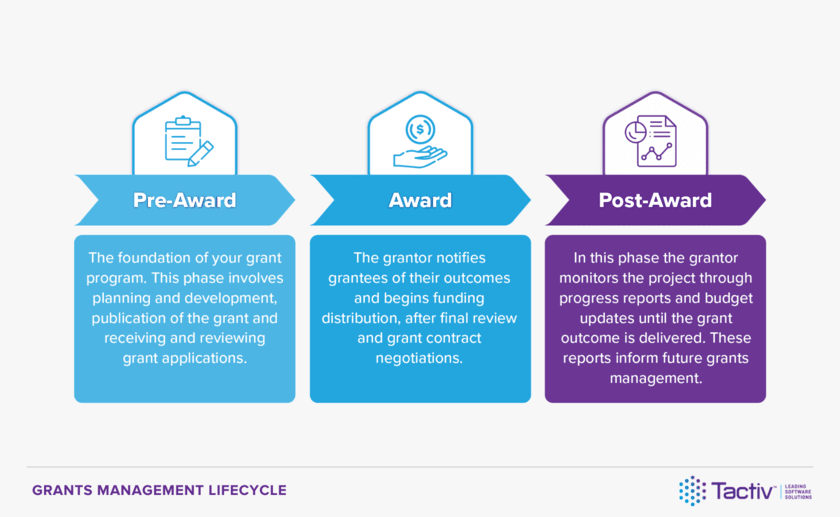

Pre-Award Phase
The pre-award phase is the foundation of a grant program. In this step the grantmaking organisation develops and announces the funding opportunity, before receiving and reviewing grant applications.
➔ Explore our full guide to managing online grant applications here
The main steps conducted by grant managers during this phase of the grant lifecycle include:
- Establishing a funding round – Based on the organisation’s mission or charter, the establishment of the funding round includes the development of funding details such as budgets, and funding timelines. It also includes the aims and objectives of the program. This helps inform the development of the grant application, eligibility, and assessment criteria.
- Developing guidance for applicants – Developing grant applications with clear eligibility and assessment criteria, grant managers can prequalify applications resulting in more qualified applicants, In turn, this leads to a more streamlined and competitive assessment process. It’s also beneficial to provide guidance on the grant opportunity’s open and close dates, as well as any supporting documents that should be attached for review.
- Publishing the grant opportunity and collecting applications – Once the grant round has been developed with clear mission objectives and guidance for applicants it is time to publish and promote the grant opportunity.
- Grant assessment begins – When grant applications have been collected the grant manager begins the assessment process. This will involve an initial review to shortlist applications that align most closely with the organisation’s mission and the grant opportunity’s intended outcomes.
Award
The award phase is the shortest of the three phases of the grant lifecycle but is far from the simplest. This phase requires significant communication as grant managers begin to define terms and conditions around the funding. Additionally, it often requests further information from the grant applicant.
- Notify applicants of their outcomes – All applicants should be notified of whether their application was successful. For those who were successful, it may be necessary to collect additional project planning information. This documentation will inform the grant contract’s terms and are necessary before the next step in the award phase.
- Funding distribution – After terms have been negotiated and the grantor and grantee have come to a legal agreement on the grant project’s deliverables, budgets and timeline, funding will be distributed. Then the grant project can begin.
Post-Award
The post-award phase of the grant lifecycle requires grant managers to maintain ongoing communication with the grantee. Critically, this involves milestone tracking to ensure deliverables are met against budgets and timelines, and reporting on these milestones at regular intervals.
- Progress reporting – Grant progress reporting will occur at regular intervals determined by the grant contract agreed upon during the award phase. These reports will likely include financial information on spending against the grant budget, as well as output information related to the grant project’s objectives. Reports may also involve on-site visits by the grantor’s organisation to see how the grant project is progressing for themselves.
- Outcome reporting and acquittal – To close out the grant, the grantee will submit a final report for the grantmaking organisation to assess the grant’s financial and project specific outcomes performance. This data is critical to determine how successful the grant was and is necessary for the final step in the post-award phase of the grant lifecycle.
- Grant analysis and future planning – With all of the information collected throughout the post-award phase on hand, grant managers begin to plan for future iterations of their programs. They do this by converting these project specific insights into actionable guidelines for implementation.
By applying grants management best practices throughout the three phases of the grant lifecycle you can further streamline your grant processes.
Grants Management Best Practices
Grants management best practices help ensure consistent and replicable results throughout your grant programs. While your organisation should develop its own best practices unique to your grant processes and mission-specific goals, these best practices help refine your collaboration, transparency, and grant outcomes. So let’s dive in.
1. Promote collaboration throughout the grant lifecycle
Collaboration is essential to effective grants management. Not only should you aim to communicate regularly with your grantee to support their grant project delivery, but you should also make grants management data accessible to your team. This prevents your team from working with disparate data and ensures a more focused approach to grant project delivery.
2. Make your external processes as easy as possible for your grantees
It’s important to remember how busy your grantees are – especially when it comes to building your reporting forms and applications. Eliminate redundant questions, and where possible reuse data that you have captured elsewhere. A form with less questions overall will often result in more detailed and relevant responses. Consequently, this makes the grant manager’s job easier overall.
3. Streamline grant processes for speed and replicability
There are many administrative processes throughout the grant lifecycle that seem laborious and time intensive. While making your grants management data more available for internal collaboration is the first step to improving process speed, the key to streamlining outcomes is simply to replicate what works. Data retention and analysis helps inform this process. As such, you should prioritise date and time-based metrics when reviewing your grant operations.
4. Incorporate data driven decision making in your grants management
Date and time-based analysis is essential to streamline your grant processes, there is a wealth of additional data available throughout your grants management. Drawing out figures such as applications received for a given grant opportunity, or outcomes achieved by a particular grant delivery agent should inform your future decision making. For example, by extending or reducing the grant application window or inviting high performing applicants to closed grant opportunities. The key here is to have an effective system to collect this data in, that doesn’t require constant upkeep and maintenance. The more seamless your data collection, the more informed your analysis will be.
5. Ensure your grant processes are auditable and transparent
Data collection and retention is also vitally important for regulatory and public interest reasons. While each jurisdiction will have different regulatory requirements for grantmaking organisations to report to, it is best practice to maintain an audit log of key events throughout the grant lifecycle. This data should involve the time and dates decisions were made. Also, decision making rationale and the names and organisational roles of key grant assessors are important.
6. Implement an end-to-end grants management system
As grants management best practices have developed over time, software solutions have emerged. They are often mapped to the three phases of the grants lifecycle. By implementing a purpose-built grants management system it is easier to collect and manage the data you need to maintain productive relationships with your grantees, internal team, and key stakeholders.
➔ See how these grants management best practices apply to local government grantmakers here
In addition to these best practices, there are several principles and grants management policies that help keep grants managers from mismanaging grant projects.
Principles of Good Grants Administration
Mismanaged grants, or grant fraud, likely cause organisations reputational damage. Or worse, they lead to high profile grant controversies impacting local, state, and federal governments. For non-government grantmaking organisations, these principles can also help ensure processes run smoothly and create lasting outcomes.
These grants administration principles provide the basis for grant fund design and governance. It ensures collaboration and the attainment of project outcomes that represent value for money.
1. Preparedness
During the grant’s pre-award phase, it is vital that grants administration teams show clear evidence of strategic planning. By planning strategically from the onset of a grant program it is easier for grants managers to identify and assess risks before they emerge, while ensuring grants align with organisational objectives. In some cases, a grant project may not actually be the best approach to achieve a given outcome.
Robust grants planning requires a thorough assessment of the expected costs, benefits, risks, and opportunities of a potential grant project. This includes any perceived conflicts of interest. As part of this process, grant application and assessment design must also be considered. Lackluster application design and unclear grant assessment protocols impact the auditability of grants programs. This often results in the greatest public criticism and media controversy.
All grantmaking organisations should develop clear guidelines and documentation to inform their grants administration. These guidelines are to be tailored to individual grants projects accounting for variables including:
- The general purpose, intended outcomes and deliverables of the grant project.
- The dollar value and expected duration of the grant.
- The experience and responsibilities of the grant applicant.
These variables should in turn inform:
- Eligibility and assessment criteria.
- Grant application questions, formatting, and validations.
- The project stakeholders involved in the assessment process.
Effective grants administration planning also requires the development of a means to measure and manage grant project outcomes.
2. Outcomes Orientation
By adopting an outcomes orientated approach to grants administration, grants managers will more thoroughly implement best practices around collaboration and data-driven decision making.
In the first instance, an outcomes orientation involves forecasting how a grant proposal’s activities will result in the target outcome. This information will in turn inform the development of your project performance indicators. This will then enable the grants administration team to monitor and evaluate in-flight grant projects.
An outcomes orientation help focus the efforts of your grant recipients. Examples of this is linking these project performance indicators to the outputs delivered or linking to outcomes achieved by grantees during project reporting. By conducting outcome orientated impact reporting throughout a grant project, it is easier to evaluate a grant’s performance during project close. This includes assessments of value for money, and community benefits.
Effective grants management that delivers value for money outcomes requires accountable and transparent processes.
3. Accountability and Transparency
Setting achievable targets at the outset of a grants program increases accountability. Both the grantee and grants manager will have a clearer understanding of their responsibilities throughout the grant lifecycle.
Good grants administration requires governance structures that ensure accountability and efficiency throughout all processes. This is particularly true for functions such as assessment, where individual actors may have a large sway over funding decisions. Implementing a more transparent decision-making process, includes having clear guidelines and criteria for the assessment process. This makes grantmaking organisations less likely to face accusations of grant fraud or mismanagement.
Some grant projects require domain expertise to complete the assessment process. In these cases it’s useful to invite external subject matter experts to partake in the assessment process. It is also important to make clear that the assessor is from outside of the organisation. Additionally, it’s key to declare if any conflicts of interest may arise through their involvement. Some organisations adopt a register of interests to manage such challenges transparently.
Another requirement for transparent and accountable grants administration is detailed record keeping. For some grantmaking organisations, including government departments, there is an expectation of more stringent record keeping, often enforceable by law. These requirements will vary, but at a minimum, records should be kept that disclose the times and dates key decisions were made. Additionally, it’s key to record who made these decisions and at what stage throughout the grant lifecycle.
In larger teams, roles should be clearly defined for who is responsible for each process. It makes it easier to identify blockages or holdups in grant processes. Doing so can also create a separation of duties which adds checks and balances to internal processes. Consequently, this significantly reduces the likelihood of corruption and maladministration.
➔ Sign up for our newsletter to stay up to date with the latest trends in grants administration
So, how do you systematically implement these grant management best practices and principles for good grant administration? All grantmaking organisations should consider adopting a purpose-built grants management system.
What Is a Grants Management System
A grants management system is a software solution designed to streamline the core processes throughout the grants lifecycle. At the same time, they connect grant managers with grantees and grant beneficiaries. By adopting a grants management system, grants administrators can automate repetitive tasks. As a consequence, they can focus more on delivering impactful outcomes and supporting their grantees.
The Benefits of an End-to-End Grants Management System
End-to-end grants management systems provide complete coverage across the grants lifecycle. These systems are an important investment for any grants management team. They significantly enhance data access and availability, contract and compliance management and grant project performance management and scalability.
Enhanced Access to Data – Cloud-based grants management systems enable grants management teams to access data from anywhere, at anytime so long as they have an internet connection. This enhances collaboration by removing the data siloes that plague desktop application and paper-based grants management. End-to-end grants management systems also collect data throughout every process, from application to assessment, reporting to acquittal. This helps teams reflect on processes individually and in relation to one another. In turn, this informs business process optimisation and future program development.
Contract and Compliance Management – Grant contracts underpin project timelines, budgets, and deliverables. End-to-end grants management systems enforce these contracts by storing these critical documents and making timelines, budgets, and deliverables clear and manageable throughout the system. With detailed scheduling screens, complete with funding allocation data and milestone tracking, grant contracts can be managed with greater confidence.
Improved Grant Tracking and Scalability – End-to-end grants management systems not only reflect the optimal process for managing a single grant but should also reflect the structure in which grants relate to one another. Purpose-built systems operate on a portfolio-program-project basis. This enables managers to track and compare grant performance overtime in association with past efforts. In conjunction with the enhanced access to data grants systems provide, this structure enables grants managers to refine processes and scale their impact overtime.
This short video showcases how a leading grants management organisation realised these benefits through the adoption of the Enquire Grants Management System.
It’s important to remember that not all software that positions itself as a grants management solution is the same. Many systems service only a part of the entire end-to-end process. This stands in the way of achieving the full benefits described above. As a result, these systems can be dropped due to a lack of interoperability and uptake by the wider grants team.
There are different types of grant management systems with varying degrees of functionality. Below are the key features you should prioritise to optimise your grants administration.
Key Features of a Grants Management System
A true grants management system must be able to manage the end-to-end processes of the grants lifecycle. So here are six features that help grant managers drive outcomes from application to assessment, reporting to project acquittal.
1. Templated Grant Publication
To help simplify the complexity of the pre-award stage of the grant lifecycle, grants management systems allow grants managers to:
- Create application forms and grant opportunities from templates.
- Manage grant round start and close dates in system to easily extend the application window.
- Open grant rounds to the public or by-invitation depending on the grant opportunity.
2. Online Self-Service Client Portal
Grants management systems also help facilitate grant administration by allowing applicants, contractors, reviewers, and other stakeholders to easily complete their tasks in a self-service client portal. Consequently, it allows them to:
- Quickly register, start, continue, or amend their applications, assessments, or reports.
- Review submitted work or download in-flight applications.
- Track changes made in a report or document using workflows and comments.
- Access notes, workflows, forms making it easy to collaborate anywhere, anytime – including mobile devices.
3. Integrations for Payment Processing
It’s important to link financial activity to a grant program’s performance in a streamlined in a grants management system. As such, when grant managers adopt systems with financial system integrations they can:
- Schedule and automate grant payments.
- Create and approve payment invoices in batches.
- Automatically validate and reconcile grant payments in system.
- Maintain a completely auditable history of payments against grant outcomes.
➔ Download our free factsheet on grant financial management
4. Configurable Business Process Workflows
A grants management system should be configurable to your organisation’s processes. Not only does this make the system feel truly your own, but it also reduces the learning curve. Therefore more of your team can take advantage of its benefits. Configurable business process workflows:
- Drive core grant lifecycle processes such as assessment, grant contracting and progress reporting.
- Utilise comments for internal and external collaboration and information sharing.
- Include clear indicators of who is responsible for the current workflow step using configurable user roles.
- Promote the principles of good grants administration by including time stamps and status labels for full auditability.
5. In System Notifications, Emails and Alerts
Given the range of stakeholders involved internally and externally in any given grant project, collaboration is essential for successful grant outcomes. Therefore, grants management systems should include features that:
- Notify grant applicants of assessment outcomes using bulk email responses from a configurable email template library.
- Inform members of the grants management team when they are responsible for an upcoming activity – such as a workflow step.
- Automatically notify external stakeholders that they are responsible for assessment, reporting or other tasks via email and external portal notifications.
6. Integrated Reporting
Grants management systems facilitate data collection and storage throughout the grants lifecycle. To maximise the value of this data a grants system allow grants managers to:
- Search and filter for data from across their grant programs using free text search, filters, and configurable data columns. As a results, you are able to save, favourite and share these searches with your grants management team.
- Configure reporting indicators to align their programs with common standards such as the United Nations’ Sustainable Development Goals.
- Utilise reporting indicators across programs and projects, including within progress and outcome reporting, to enable comparability and performance review.
- Export data in configurable reports, one-click snapshot reports, and more to share with stakeholders. Data should also be available for manipulation in BI tools to visualise your grant impact. Eventually, it should inform your future grant management decisions.
➔ Experience these features by requesting a free Enquire demo
The Enquire Grant Management System
Enquire is a purpose-built grants management system that is trusted by leading funding organisations for two decades.
Looking to bring a grant program online for the first time? Or wish to learn more about the system and it’s features? Contact our team or discover more on about Enquire here.


